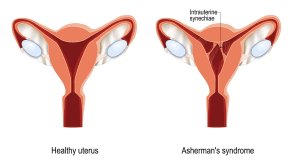 When couples face unexpected roadblocks on their fertility journey, the cause is not always immediately clear. One lesser-known but significant condition that can impact a woman’s ability to conceive or carry a pregnancy is Asherman syndrome. This condition occurs when scar tissue (also called adhesions) forms inside the uterus, often as a result of surgery such as dilation and curettage (D&C), cesarean delivery, or other uterine interventions. These adhesions can partially or completely block the uterine cavity, interfering with menstruation, implantation, and pregnancy. In the video below, CFI patient Emily Seals discusses her fertility journey and her experience overcoming Asherman Syndrome with the help of Dr. Yalcinkaya and the team at Carolinas Fertility Institute.
When couples face unexpected roadblocks on their fertility journey, the cause is not always immediately clear. One lesser-known but significant condition that can impact a woman’s ability to conceive or carry a pregnancy is Asherman syndrome. This condition occurs when scar tissue (also called adhesions) forms inside the uterus, often as a result of surgery such as dilation and curettage (D&C), cesarean delivery, or other uterine interventions. These adhesions can partially or completely block the uterine cavity, interfering with menstruation, implantation, and pregnancy. In the video below, CFI patient Emily Seals discusses her fertility journey and her experience overcoming Asherman Syndrome with the help of Dr. Yalcinkaya and the team at Carolinas Fertility Institute.
Women with Asherman syndrome may experience symptoms such as light or absent periods (amenorrhea), recurrent miscarriage, or unexplained infertility. In some cases, they may not know they have the condition until they begin fertility testing. Because Asherman syndrome can mimic other reproductive health issues or go undetected during routine exams, diagnosis often requires specialized imaging such as a hysteroscopy or saline sonogram to identify and assess the extent of uterine scarring.
The good news is that Asherman syndrome is treatable. Surgical removal of adhesions, typically via hysteroscopic surgery, can restore the shape and function of the uterus. After treatment, many women go on to have successful pregnancies—though follow-up care is essential, as adhesions can sometimes recur. For those navigating fertility treatments like IVF, identifying and treating Asherman syndrome can significantly improve the chances of a healthy pregnancy.
Raising awareness about Asherman syndrome is an important step in supporting individuals and couples on their fertility journeys. If you or someone you love is struggling with infertility or pregnancy loss and has a history of uterine surgery, it’s worth asking your provider whether further evaluation for intrauterine adhesions might be appropriate. Sometimes, the answers lie just beneath the surface—and finding them can be the first step toward healing and hope.




